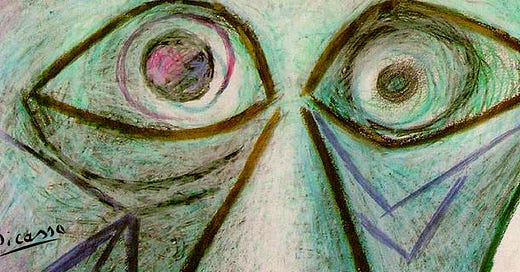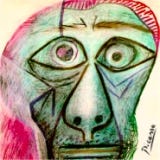Many of us deal with inner conflicts, self-reproach, and meagerness of faith... It is reported that on his deathbed Reb Zusya said, "I am not afraid that the Holy One will ask me, 'Zusya, why were you not more like Moses?' Rather, I fear the Holy One will say, 'Zusya, why were you not more like Zusya?'" This Hasidic story is interesting because, on the one hand, how could Zusya be anyone other than he is? and on the other, why is Zusya afraid that he is not who he should be? Zusya's parable reveals that there is an inner conflict in his soul. He senses that has not lived as he ought, that he has failed himself (and God), and that he is lost in the rift between the ideal and the real... His struggle, then, is with himself. Who he is and who he thinks he should be are at odds within his heart.
The question of who we are supposed to be haunts us, and consciousness of the failure to practice our ideals leads to a sense of guilt, anxiety, and shame. For those who believe in Yeshua the question is essential to the question of what it means to be an authentic disciple. How are we to live before God and be accountable for what we do? For instance, we read Yeshua's message in the Sermon on the Mount and we eventually realize - if we are honest with ourselves - that it is not within our nature to be able to do as he teaches, and this leads us to a despair not unlike that which Zusya experienced. A divided house cannot stand....
Reb Zusya's despair can be remedied only by overcoming the inner divide through a personal relationship with Yeshua, for salvation is not simply deliverance from the accusations of conscience (i.e., the verdict of the law) but constitutes the healing grace that delivers us from ourselves. Yeshua did not die on the cross to simply take away our sins, but to create within us indestructible new nature that it no longer enslaved to the power of sin. The message of the gospel is that your heart can be - and ultimately will be - transformed by the miracle of God given in Yeshua.
Salvation is not a matter of "religion" or of man's attempt to justify himself by some kind of reformation of character. Yeshua is not the "second coming of Moses," after all. Try as you might to live a "good life," keep the commandments, and aspire to elevate yourself spiritually, you will eventually come to realize that it is impossible to change yourself. You will then be faced with a decision: either to deceive yourself about who you are, or to be honest and confess your wretched and hopeless condition. This is the "lawful use of the law," that reveals the "ought-to-be" self, so that the gap between the ideal and the real becomes unsurpassable, and we know ourselves as lost sinners who are in peril over ourselves...
In our natural estate we are "fallen," shattered of heart, full of trouble "as the sparks fly upward." As Simone de Beavoir once wrote: "In the very condition of man there enters the possibility of not fulfilling who he is" (Ethics of Ambiguity, 1947). The breach between who we are and what we ought to be creates a sense of alienation from ourselves, a "shadow self" that we deny, suppress, or try to control. In a moment of rare lucidity, the "natural man" cries out to God: "What do you want from me?" This is the moment when truth has its opportunity, when the heart is stirred to confess its need for deliverance and to accept God's love, despite the brokenness and incoherence of life.
When by miracle we escape from the "hard yoke" of our laws, our vain attempts at self-justification, we do not encounter another set of laws, or another heavy yoke, but we take hold of the love of God, a personal love, and we engage in relationship with God as the central (and unifying) reality of our lives. Deliverance from ourselves is not found in religious (or "spiritual") recipes of any kind but in our connection with the truth of who God really is, trusting in his love and healing for all that we are, have been, and ever shall be, amen.
"Salvation is of the LORD," which means that God does the work of righteousness within you. It is God who saves you; it is God who sanctifies you, and ultimately it is God alone who heals you. Whenever you say "I can't," you are either looking at yourself or at God. If you are looking at yourself, "I can't" is better understood as "I won't," and the problem then is a lack of faith. On the other hand, if you are looking at God, "I can't" is followed by "but You can, O Lord" and faith trusts that God will complete the good work that he has begun in you.
God sends each soul into the world with a special message to deliver, a revelation that only he or she can disclose... As George MacDonald once said, "I would rather be what God chose to make me than the most glorious creature that I could think of; for to have been thought about, born in God's thought, and then made by God, is the dearest, grandest and most precious thing in all thinking." That's the good news of the gospel, friends: God not only saves us from ourselves, he remakes us to be true bearers of his image and likeness. He works all things together for his glory and our good. Amen, let it be so, O Lord!
Psalm 51:10
לֵב טָהוֹר בְּרָא־לִי אֱלֹהִים
וְרוּחַ נָכוֹן חַדֵּשׁ בְּקִרְבִּי׃
“Create for me a pure heart, O God,
and renew a willing spirit within me.”
Psalm 51:10 Hebrew page (pdf)





Amen! I believe this is what Yeshua has been trying to teach me for several years now.
Absolutely love this encouraging word... Yes, how I long to change but find the true changes are only available through my trusting Jesus to remake me. He has changed me and continues to change me. Thankfully. God bless you.